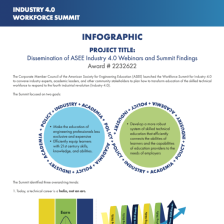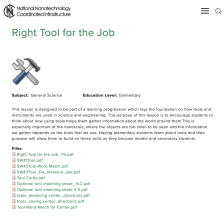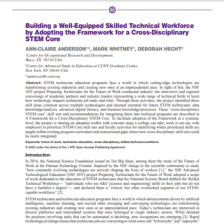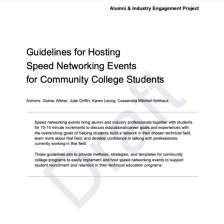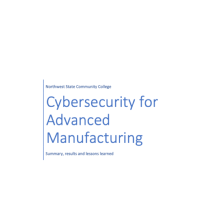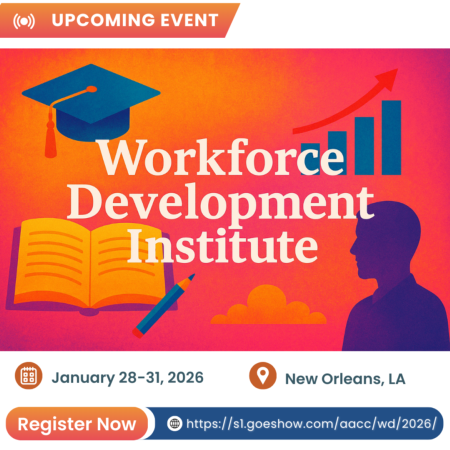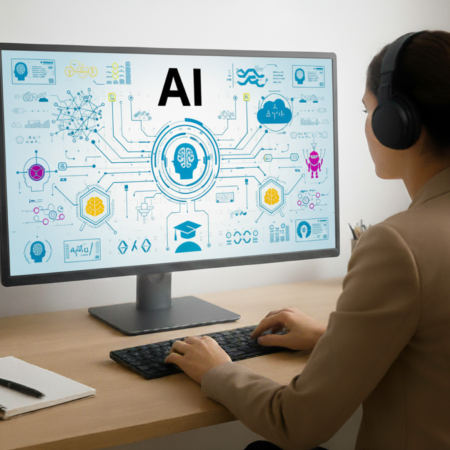ATE is Advanced Technological Education. With an emphasis on two-year colleges, the National Science Foundation's ATE program focuses on the education of technicians for the high-technology fields that drive our nation's economy.
Community Conversations: Reflecting on 2025 – Lessons Learned
Meeting
December 16 Online
In this community conversation, ATE PIs, project evaluators, and staff will reflect on the lessons learned throughout 2025 and discuss how these insights can be applied to enhance evaluation practices moving forward.
(View More)
Hawaii International Conference on System Sciences
Conference
January 6 Lahaina, HI
Since 1968, the Hawaii International Conference on System Sciences (HICSS) has been known worldwide as the longest-standing working scientific conferences in Information Technology Management. HICSS provides a highly interactive working environment for top scholars from academia and the industry from over 60 countries to exchange ideas in various areas of information, computer, and system sciences. According to Microsoft Academic, HICSS ranks the 36th in terms of citations among 4,444 conferences in all fields worldwide.
(View More)
Scouting America Badging Day
Student Event
January 10 Thief River Falls, MN
Scouting America Merit Badge Day will be held at Northland Community & Technical College. Scouts will have the opportunity to participate in a variety of engaging classes, including Aviation, First Aid, Welding, Law Enforcement, and Citizenship in the Nation. This event is designed to give Scouts hands-on learning experiences while working toward their merit badges.
(View More)
KidWind - Wind Energy 101
Workshop
January 10 Online
Join for this wind-focused, three-hour virtual workshop to explore the science of wind power!
During this virtual workshop, educators will learn the foundations of wind power including the science and technology of wind turbines and blade design. Presenters will also introduce activities for the classroom that engage students in dynamic, hands-on energy-based learning.
Registration closes December 27th so you receive materials prior to the workshop.
(View More)
Generative AI and Microsoft Copilot Training for Community College Faculty and Staff: 101
Webinar
January 15
This session is designed for community college faculty and staff exploring the fundamentals of Generative AI and Microsoft Copilot. Topics include Generative AI and responsible AI use, effective prompting techniques, and real-world applications in education. This session will provide practical insights and hands-on guidance to help integrate AI tools into your work.
(View More)
Google's Generative AI Leader Training and Certification
Meeting
January 16 Online
Become one of the first go-to resources and thought leaders in Generative AI Leadership, enhancing your visibility and influence within the organization. This no-cost opportunity, funded by Google Cloud’s Career Launchpad, and in collaboration with NAAIC, will prepare community college faculty for the Google Cloud Generative AI Leader certification.
The training will cover:
- Fundamentals of Gen AI
- Google Cloud's Gen AI offerings
- Techniques to improve Gen AI model output
- Gen AI business strategies
Training sessions
Session 1: January 16, 2026, 10 to 4:30 PM EST, online
Session 2: January 23, 2026, 10 to 4:30 PM EST, online
Office hours (optional): January 30, 2:30 to 4 PM EST, online
Certification exam deadline: January 31, 2026
(View More)
SPIE Photonics West 2026
Conference
January 19 Online
SPIE Photonics West is the premier event for lasers, biomedical optics, optoelectronics, and technologies supporting biophotonic, quantum, and vision applications.
View the lineup of outstanding plenary speakers from around the globe. Select advanced training from 60 course options. Discuss your product requirements with top optics and photonics suppliers at any of the five exhibitions throughout the week, and participate in the strong industry program – this year now on three stages!
(View More)
Generative AI and Microsoft Copilot for Community College Faculty: 102
Webinar
January 20
This follow-up webinar is designed for faculty looking to integrate Generative AI and Microsoft Copilot into their curriculum. We'll start with a brief review of Copilot Chat, then explore practical strategies for incorporating AI-driven tools into lesson plans. We'll also examine real-world use cases from various disciplines.
(View More)
Generative AI and Microsoft Copilot for Community College Faculty: 102
Webinar
January 20
This follow-up webinar is designed for faculty looking to integrate Generative AI and Microsoft Copilot into their curriculum. We'll start with a brief review of Copilot Chat, then explore practical strategies for incorporating AI-driven tools into lesson plans. We'll also examine real-world use cases from various disciplines.
(View More)
Community Capabilities Webinar | The NCERC Experience
Webinar
January 21
The National Corn-to-Ethanol Research Center (NCERC) at Southern Illinois University Edwardsville is a nationally recognized Biorefining Center of Excellence dedicated to advancing the commercialization of biofuels, biochemicals, biomaterials, and other bio-based products. NCERC offers a comprehensive range of workforce development programs, including job shadowing, internships, graduate assistantships, and visiting research fellow programs, as well as professional workshops. Through the various programs, trainees gain real-world experience inside a functioning biomanufacturing pilot plant and are equipped with the skills needed to lead in a rapidly evolving biobased economy.
(View More)
Microsoft Azure AI-900 Training
Webinar
January 23
Are you a community college faculty member eager to equip your students with the AI skills employers are seeking right now? To help you become a confident instructor of Microsoft AI content, you are invited to apply for a complimentary, two-day train-the-trainer bootcamp designed to fully prepare you for the AI-900: Microsoft Azure AI Fundamentals certification. This intensive program also introduces you to Microsoft Learn for Educators (MSLE), offering access to official courseware, hands-on labs, and curated teaching resources.
The online training will be delivered by Black Dog Black Cat, a Microsoft Certified Trainer, and will include materials, labs, and resources. AI-900: Microsoft Azure AI Fundamentals certification exam vouchers will be available to all educators who successfully complete both training sessions. Online proctoring will be available at a discounted rate of ~$30 and instructions on how to take your certification exam online will be provided.
Following the training, a Teams channel will be available for the MSLE AI Bootcamp educators, including training materials, session recordings, and a forum to post your questions regarding MSLE access and the AI-900 certification exam.
(View More)
Introducing BioSuite Virtual: Immersive Biomanufacturing Training for Tomorrow’s Workforce
Webinar
January 23
Join Jared DeCoste and Dan Beaupré of Prism Immersive for an introduction to BioSuite Virtual—a mixed-reality training platform developed to expand access to high-quality, job-ready biomanufacturing education.
Developed with industry and academic support and integrated with BioSciences Core Skills Institute (BCSI) credentials, BioSuite Virtual enables learners to perform end-to-end upstream bioprocesses—from bioreactor assembly and aseptic technique to fermentation monitoring and analysis—within an interactive virtual laboratory. Its innovative learning design contextualizes the development of critical skills with the guidance and flexibility needed for effective, self-paced learning.
(View More)
Spray Drone End User Conference
Conference
January 25 Kansas City, MO
The Spray Drone End User Conference is the only event built for the industry, by the industry. This five-day, full-scope experience brings together the best minds in aerial application, drone technology, and ag business to help you sharpen your skills, grow your network, and move your business forward. This is the largest ag drone-focused event in North America.
In-person and virtual options available.
(View More)
ATE Projects and Centers
Advanced Manufacturing Technologies topics include:
- Additive manufacturing
- Automotive manufacturing
- General manufacturing
Agricultural and Environmental Technologies topics include:
- Agriculture and aquaculture
- Environmental technologies
- Natural resources
- Nuclear power
- Solar energy
- Wind power
Bio and Chemical Technologies topics include:
- Biotechnology
- Chemical and process technologies
Engineering Technologies topics include:
- Electronics and controls
- General engineering
- Marine technologies
- Materials technologies
- Optics
- Space technologies
General Advanced Technological Education topics include:
- Evaluation
- Learning research
- Recruitment
- Teacher preparation
Information and Security Technologies topics include:
- Geospatial technologies
- Information and communications technologies
- Logistics
- Security, information assurance, and forensics
Micro and Nanotechnologies topics include:
- MEMS
- Microsystems
- Semiconductors
This collection includes three documents and twelve video clips that summarize the results of the Workforce Summit for Industry 4.0 launched by the Corporate Member Council of the American Society for Engineering Education (ASSE). The Workforce Summit for Industry 4.0 brought together "experts, academic leaders, and other community stakeholders to plan how to transform education of the skilled technical workforce to respond to the fourth industrial revolution." The 3-page infographic, 4-page executive summary/policymaker's briefing, and the 8-page white paper each provide an overview of the summit in varying detail. The documents introduce the summit and discuss its goals, themes, key recommendations for technician education, and examples of promising instructional models for training skilled technical workers. Additionally, the white paper discusses the findings of summit meetings and summarizes the webinars that led up to the summit. The video clips run from three to ten minutes and...
(View More)
This lesson, presented by the National Nanotechnology Coordinated Infrastructure, introduces elementary students to the concept of using tools to gather information about the world around them. This provides a useful skill foundation for students as they continue into middle and high school and encounter more complex tools. Especially for nanotechnology, the use of tools is extremely important because our knowledge of nanoscale objects relies entirely on the data collected from those tools. Included in this lesson are: Student Worksheet #1, Student Worksheet #2, Student Worksheet #3, Optional Tool Matching set k-2, Optional Tool Matching set 3-5, Center Directions - Matching, Center Directions - Seeing, Word Match Sheet, and Tool Cards.
(View More)
This issue of J ATE, published by Portland Community College, focuses on the theme of professional engagement. J ATE is a peer-reviewed technical journal focused on community college faculty and staff who work with technician education. This journal is cross-disciplinary and encompasses all technologies under the National Science Foundation (NSF) Advanced Technological Education (ATE) Program. Some of these technologies include: Micro Nano, Biotechnology, Autonomous Technology, Cyber Security, Advanced Manufacturing, Earth Sciences, Agriculture Technology, Energy, and Welding. Some topics that cross cut across all disciplines of technician education are also covered. Those topics include: Evaluation, Mentoring, Undergraduate Research, and Applied Technician Research.
This 108-page issue of J ATE includes 11 full articles and five guest letters written by ATE professionals. Listed below is each article and corresponding DOI number in parentheses.
- Building a Well-Equipped Skilled...
(View More)
These 21-page guidelines "provide methods, strategies, and templates for community college programs to easily implement and host speed networking events to support student recruitment and retention in their technical education programs." The guidelines were developed from biotechnology speed networking events held at City College of San Francisco, Austin Community College, and Johnston Community College, and provide a step-by-step guide for each phase of the speed networking process. Included are the following sections:
- Organization & Coordination
- Timeline
- Speed Networking Event Planning
- Benefits & Outcomes
- Variations on Implementation
- Recruitment
- Skill Building and Retention
- Maintaining Alumni Network and Community
- In-person Events
- Management
- Who could do the work?
- Creating and Sharing Materials
- Speed Networking Event Tips & FAQs
- Tips for Getting Started
- Tips for Sustainable Implementation (Building Speed Networking into your Program)
- ...
(View More)
This 15-page report, provided by the Cybersecurity Education for Advanced Manufacturing Organizations (CAMO) project, summarizes the build process for CAMO training scenarios, the results of implementing scenarios, and the lessons learned throughout. The training scenarios were developed by CAMO to address poor cybersecurity defenses in manufacturing organizations and the lack of security awareness among engineering technicians. The scenarios were designed to make cybersecurity instruction as accessible as possible, and can be used in both face-to-face and remote learning environments. The report provides an overview of the scenarios, discussing the content of each, their development, how to use them, and their impact on students. The scenarios have been used in high schools, two-year colleges, and four-year colleges. The report includes statistics on the efficacy of the each scenario. Also discussed in detail is the virtual industrial control system (ICS) designed for the project,...
(View More)
| Active ATE Centers | 15 |
| Active ATE Projects | 291 |
| ATE Resources | 6,967 |
| New Projects/Centers | 62 |
| New Resources | 59 |
ATE Resources by Subject Area
ATE Events by Subject Area
Upcoming Event: Workforce Development Institute 2026
Registration is now open for the American Association of Community Colleges' (AACC) annual Workforce Development Institute (WDI). The conference will be held January 28 through January 31, 2026, in New Orleans, Louisiana.
WDI will bring together community colleges faculty, industry leaders, and government partners committed to developing and strengthening the national workforce pipeline. Attendees will have the opportunity to engage with plenaries, exhibit halls, speakers panels, and executive-listening sessions across a variety of topic pertinent to community colleges and workforce development. Pre-conference programming is also available.
To learn more or to register for AACC's 2026 Workforce Development Institute, visit the conference's website.
(View More)
New Research: Increasing Cost of Community College Education
A new College Board report shows that the average published tuition and fees for in-district, full-time students at public two-year colleges in 2025–2026 reached $4,150, an increase of $110 from last year.
State-level prices varied widely, from $1,440 in California to $8,900 in Vermont, and only nine states saw no change or increases of less than 1%.
To learn more about trends in college tuition and financial aid, read the full report from College Board.
(View More)
Upcoming Virtual Event: Google's Generative AI Leader Training and Certification
Supported by Google Cloud's Career Launchpad in collaboration with the National Applied AI Consortium (NAAIC), the free virtual event, "Google's Generative AI Leader Training and Certification," will be held on January 16 and 23, 2026. Sessions will cover the fundamental principles of artificial intelligence (AI), current AI offerings, strategies to improve the output of generative models, and relevant AI-informed business strategies. Completion of the training program will prepare community college faculty for the Google Cloud Generative AI Leader Certification.
Virtual Training Sessions
- Session 1: January 16, 2026, 10:00AM to 4:30 PM EST
- Session 2: January 23, 2026, 10:00AM to 4:30 PM EST
- Office hours (optional): January 30, 2026, 2:30PM to 4 PM EST
To learn more or to apply for the training program, visit the NAAIC website.
(View More)

 List
List